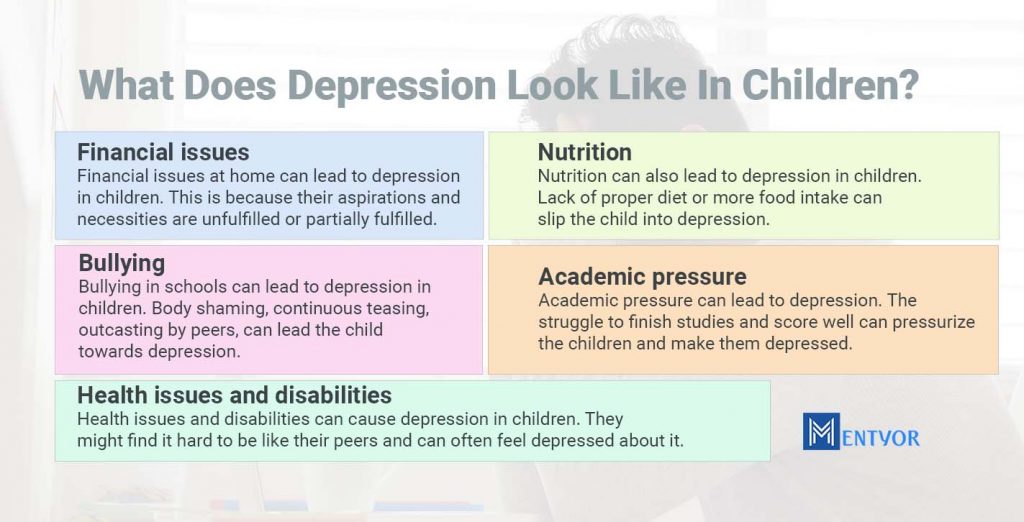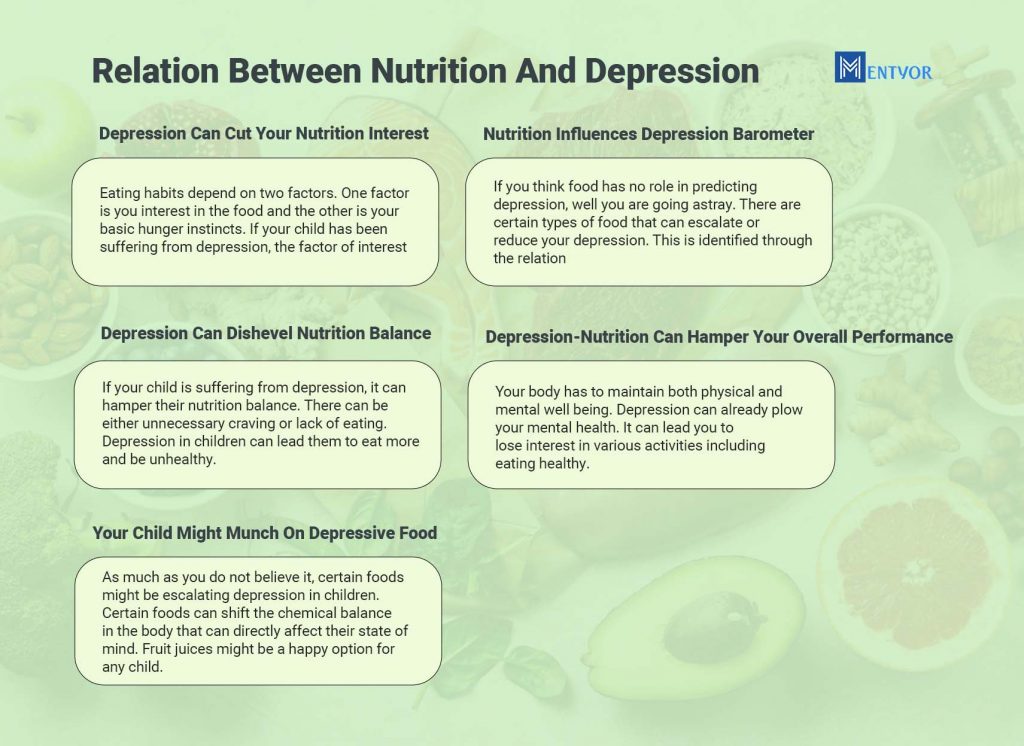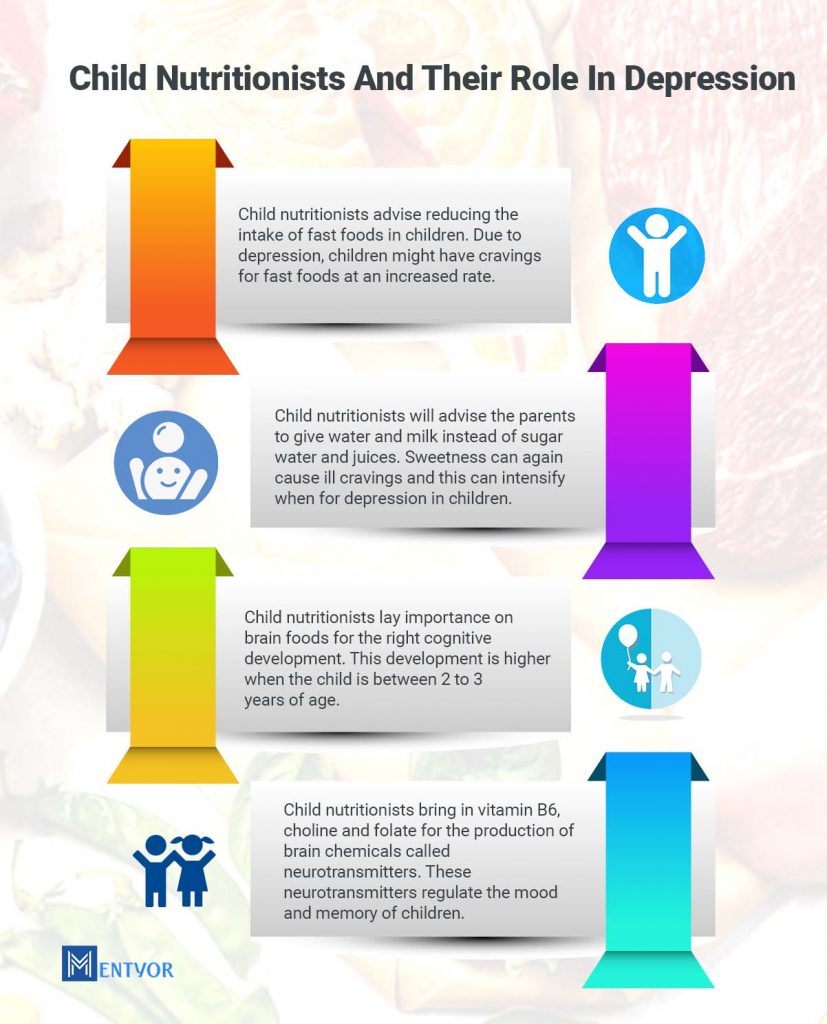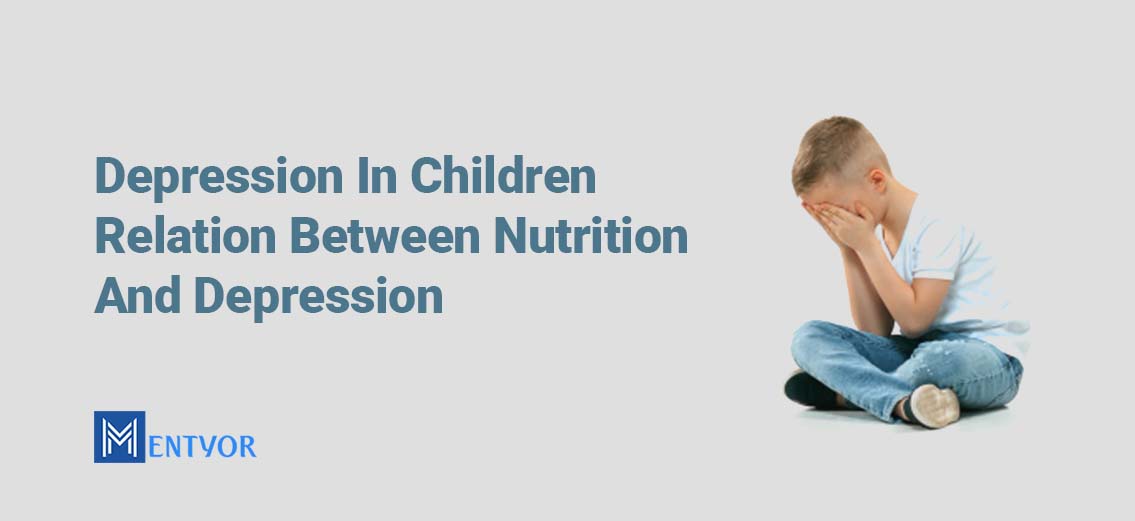Are there any chances for your child to lose nutrition while going through depression? If you are looking for the answers, it is an absolute ‘yes’. A child who goes through depression will harm their nutrition level too. The relation between nutrition and depression is a very close one. If the level of depression intensifies, the nutrition level decreases in the child. Parents must take the necessary steps when they identify symptoms of depression in children. With this, the parents should take the necessary steps, and in adversity should consult the child’s nutritionists.
It is a mandatory need for child nutritionists to understand the relation between nutrition and depression. If the depression intensifies in the children, they would eventually give up on healthy eating. Lack of healthy eating due to depression can deplete a huge source of nutrition in them. Child nutritionists must be able to close this gap between depression and nutrition. They must have the knowledge, techniques and abilities to advise what is best for a child suffering from depression.
Before knowing the relation between nutrition and depression, we must understand its basics. This includes knowing about nutrition, depression and others.
Takeaway
Children are prone to depression as much as the elders are. The relation between depression and nutrition is a crucial and impacting one.
Also read and know What is Depression?: What is Depression ? | How it cuts short our daily life ?
What Is Nutrition In Children?
In a generic sense, nutrition in children refers to the basic amenities that their bodies require. These amenities come through various food sources. Apart from keeping them healthy, these amenities ensure other actions and attention by the child. These amenities include the right amount of vitamins, minerals, carbohydrates, fats and proteins. To make sure the nutrition goes to the right levels, the right amount of food must be included in the child’s diet.
Often an increased amount of nutrients can hamper the child’s growth. In some cases, it can also push them towards grave health adversities. This includes obesity, diabetes, fatigue, and digestive issues. Nutrition in children also plays a major role in their day to day activities. It determines the physical caliber of the child and the mental well-being. For instance, if the child has more fat intake, he or she might feel lazy to do activities.
Research also suggests that nutrition in children greatly impacts learning and behavior [1]. The right intake of the nutrients like fatty acids, omega-3, minerals, iron can prevent learning and behavior disorders [1]. Lack of nutritious intake can lead to learning disorders like ADHD, communication disabilities and various cognitive disabilities. Further, lack of nutrition in children can lead to behavioral issues like decreased self-esteem, depression, OBC and more.
Nutrition can greatly trigger symptoms of depression in children. According to research studies, a lack of carbohydrates can trigger depression [2]. If left untreated, the child might develop inadequate food choices in later stages of life. This can also trigger anorexia nervosa or bulimia nervosa. Anorexia nervosa is caused by a lack of eating disorders. Bulimia nervosa is abnormal eating that could lead to obesity.
There are various symptoms of depression in children that can be indicative of a good nutritious diet. However, understanding depression is essential to identify these symptoms.
Takeaway
In a generic sense, nutrition in children refers to the basic amenities that their bodies require. These amenities come through various food sources.
What Does Depression Look Like In Children?
It is triggered by various academic and age factors. The age of children can be classified as prepubertal and early adolescence. Studies suggest that depression in children is found in different ranges. It can be a moment of sadness or major depression [3]. It can also escalate to the degree of developing bipolar disorders [3]. Also, children who share a family history of depression are more prone to getting it.
Earlier, depression in children was far from being a major field of study and treatment. Experts regarded that children had low maturity and cognitive understanding. Therefore, they are less prone to developing depression. But today, statistics reveal that 1 per cent of preschoolers, 2 per cent of school-going children and 5-8 per cent of young adolescents have depression [3]. It also is indicative of how depression in children can increase with an onset of aging. These results debunk that depression has only refrained to adults and old people.
Depression in children can be caused by various factors. Some of the common factors are:

Financial issues
Financial issues at home can lead to depression in children. This is because their aspirations and necessities are unfulfilled or partially fulfilled.
Bullying
Bullying in schools can lead to depression in children. Body shaming, continuous teasing, outcasting by peers, can lead the child towards depression.
Nutrition
Nutrition can also lead to depression in children. Lack of proper diet or more food intake can slip the child into depression.
Academic pressure
Academic pressure can lead to depression. The struggle to finish studies and score well can pressurize the children and make them depressed.
Health issues and disabilities
Health issues and disabilities can cause depression in children. They might find it hard to be like their peers and can often feel depressed about it.
The studies have also suggested that depression and malnutrition go hand in hand when the child is in school [4]. The children at the school level are subject to being ‘underweight’ and ‘depressed’ particularly due to academic pressure [4]. Lack of intervention can also lead the children to develop complex depressive disorders.
Takeaway
Depression in children is triggered by various academic and age factors. The age of children can be classified as prepubertal and early adolescence.
Also read about 10 Tips for Students to be Mentally Wise: Mental Health: 10 Tips For Students To Be Mentally Wise
Relation Between Nutrition And Depression
Nutrition and depression share a very close link. While most of us consider both of them to be different, it is not the truth. Depression can impact nutrition. Similarly, nutrition level can also determine the development of symptoms of depression in children.
For instance, you find a child disagreeing with eating food. Even after pestering him or her for a long time, the decision remains reluctant. Here, there can be possible symptoms of depression to detect. Either the child has been body-shamed which has made him or her depressed about themselves. Or, the child has experienced some emotionally challenging situation, such as being bashed by the teacher in class. Hence, this can affect the nutrition level of the child.
Therefore, there is a very close lane and the relation between nutrition and depression. Below are some points that explain the relation between nutrition and depression.

Depression Can Cut Your Nutrition Interest
Eating habits depend on two factors. One factor is your interest in the food and the other is your basic hunger instincts. If your child has been suffering from depression, the factor of interest in eating will be minimized or lost. Depression in children can cause them to think about a particular incident or feel negative emotions. If this intensifies, they will eventually develop over-thinking. In the process, they would lose interest in eating even if they are hungry.
Nutrition Influences Depression Barometer
If you think food has no role in predicting depression, well you are going astray. There are certain types of food that can escalate or reduce your depression. This is identified through the relation between the brain and the sense of the taste. For example, people who eat bitter and salty food might tend to be more anxious. Similarly, serotonin or the happy hormone is produced more in the body with sweet foods.
Depression Can Dishevel Nutrition Balance
If your child is suffering from depression, it can hamper their nutrition balance. There can be either unnecessary craving or lack of eating. Depression in children can lead them to eat more and be unhealthy. This can lead them to develop various health issues like obesity, type 2 diabetes and more. Similarly, depression can also lead the child to eat less, which can cause complications like anorexia nervosa.
Depression-Nutrition Can Hamper Your Overall Performance
Your body has to maintain both physical and mental well being. Depression can already plow your mental health. It can lead you to lose interest in various activities including eating healthy. Lack of a nutritious diet can hamper your physical health. It can lead you to the brink of dangerous diseases. In a nutshell, depression affects your child’s mental health. This in turn affects the nutrition in children as well.
Your Child Might Munch On Depressive Food
As much as you do not believe it, certain foods might be escalating depression in children. Certain foods can shift the chemical balance in the body that can directly affect their state of mind. Fruit juices might be a happy option for any child. However, they can make your child ‘hangry’. Hangry is the combination of hunger and anger. Similarly, the tasty toasts in breakfast can aggravate anxiety and depression in children. Therefore, your child and you might only contribute to the depression.
These are some of the points that highlight the relation between nutrition and depression. The relation between these two can be very aggravating for any child’s health. Decreasing the level of depression can spin into a good diet. Similarly, planning out a healthy, light die for your child, might help in reducing their anxiety.
This is where the parents need to consult the child’s nutritionists. The role of a child nutritionist is important. They must understand the relation between nutrition and depression to decide the best.
Takeaway
The relation between nutrition and depression is emphasized in key points. These are:
- Depression Can Cut Your Nutrition Interest
- Nutrition Influences Depression Barometer
- Depression Can Dishevel Nutrition Balance
- Depression-Nutrition Can Hamper Your Overall Performance
- Your Child Might Munch On Depressive Food
Also Read about 10 Reasons Why Educational Institutions Must Preach Mental Health Awareness: 10 Reasons Why Educational Institutions Must Preach Mental Health Awareness
Child Nutritionists And Their Role In Depression
Child nutritionists are the entities that help to design a healthy diet for children. They are knowledgeable about the ages, and stages of child development. They include a diet that has all the nutrient amenities in the right balance. Child nutritionists play a very important role in planning the right diet if the child is suffering from depression. Below are the ways in which child nutritionists help children with depression.

- Child nutritionists advise reducing the intake of fast foods in children. Due to depression, children might have cravings for fast foods at an increased rate.
- Child nutritionists will advise the parents to give water and milk instead of sugar water and juices. Sweetness can again cause ill cravings and this can intensify when for depression in children.
- Child nutritionists lay importance on brain foods for the right cognitive development. This development is higher when the child is between 2 to 3 years of age.
- Child nutritionists bring in vitamin B6, choline and folate for the production of brain chemicals called neurotransmitters. These neurotransmitters regulate the mood and memory of children.
These are the key roles of child nutritionists. With early guidance from child nutritionists, parents can make sure physical and mental well-being. They can prevent the child from cutting down on food and eating healthy.
Takeaway
The role of child nutritionists is immense considering depression in children. They play a major role in deciding the best diet plan for the children with depression.
Parting Note
As much as we deny depression in children, research studies prove it right. While we might argue with the age factor, depression can also hamper children. This also emphasizes the relation between nutrition and depression. Nutrition and depression are closely linked together.
If one goes down, the other can affect the child’s mental and physical well being.
In a generic sense, nutrition in children refers to the basic amenities that their bodies require. These amenities come through various food sources. Apart from keeping them healthy, these amenities ensure other actions and attention by the child. These amenities include the right amount of vitamins, minerals, carbohydrates, fats and proteins.
Depression in children is triggered by various academic and age factors. The age of children can be classified as prepubertal and early adolescence. Studies suggest that depression in children is found in different ranges. It can be a moment of sadness or major depression [3]. It can also escalate to the degree of developing bipolar disorders.
The relation between nutrition and depression is emphasized in key points. These are:
- Depression Can Cut Your Nutrition Interest
- Nutrition Influences Depression Barometer
- Depression Can Dishevel Nutrition Balance
- Depression-Nutrition Can Hamper Your Overall Performance
- Your Child Might Munch On Depressive Food
The role of child nutritionists is immense considering depression in children. They play a major role in deciding the best diet plan for the children. With early detection of depression, the parents can consult the child’s nutritionists to make sure that their child does not skip meals.
Commonly Asked FAQs
- How does nutrition play a part in depression?
Lack of nutritious food can impact the mental health of any being. It can reduce the production of tryptophan, which affects the neurotransmitters in the brain. Decreased neurotransmitters can fluctuate mood and also affect the memory of any individual.
- How does nutrition affect a child’s mental health?
Nutrition can greatly trigger symptoms of depression in children. According to research studies, a lack of carbohydrates can trigger depression [2]. If left untreated, the child might develop inadequate food choices in later stages of life. This can also trigger anorexia nervosa or bulimia nervosa. Anorexia nervosa is caused by a lack of eating disorders. Bulimia nervosa is abnormal eating that could lead to obesity.
- What is the main cause of depression?
Depression does not have a single cause. It is different to different people. It can be caused by various reasons and causes. These are:
- Psychological trauma
- Illness
- Academic pressure
- Job and financial worries
References
[1] Dani, J., Burrill, C., & Demmig‐Adams, B. (2005). The remarkable role of nutrition in learning and behaviour. Nutrition & Food Science.
[2] Rao, T. S., Asha, M. R., Ramesh, B. N., & Rao, K. S. (2008). Understanding nutrition, depression and mental illnesses. Indian journal of psychiatry, 50(2), 77–82.
[3] Garber, J., Gallerani, C. M., & Frankel, S. A. (2009). Depression in children.
[4] Khalid, S., Williams, C. M., & Reynolds, S. A. (2016). Is there an association between diet and depression in children and adolescents? A systematic review. British journal of nutrition, 116(12), 2097-2108.


 WhatsApp
WhatsApp